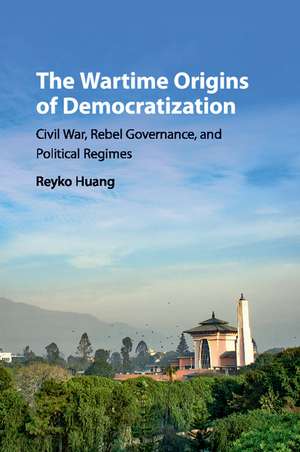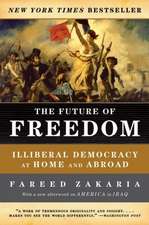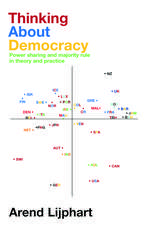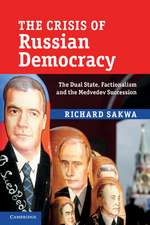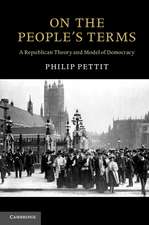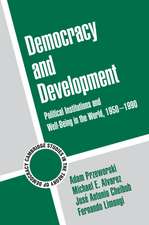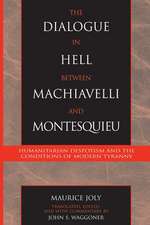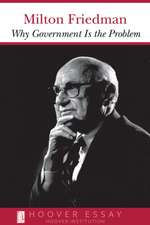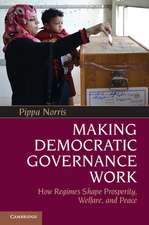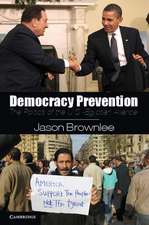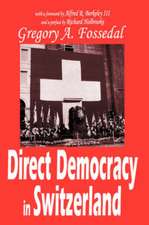The Wartime Origins of Democratization: Civil War, Rebel Governance, and Political Regimes: Problems of International Politics
Autor Reyko Huangen Limba Engleză Paperback – 16 aug 2017
| Toate formatele și edițiile | Preț | Express |
|---|---|---|
| Paperback (1) | 282.48 lei 6-8 săpt. | |
| Cambridge University Press – 16 aug 2017 | 282.48 lei 6-8 săpt. | |
| Hardback (1) | 542.40 lei 6-8 săpt. | |
| Cambridge University Press – 12 oct 2016 | 542.40 lei 6-8 săpt. |
Din seria Problems of International Politics
-
 Preț: 238.60 lei
Preț: 238.60 lei -
 Preț: 200.13 lei
Preț: 200.13 lei -
 Preț: 227.61 lei
Preț: 227.61 lei -
 Preț: 224.24 lei
Preț: 224.24 lei -
 Preț: 159.18 lei
Preț: 159.18 lei -
 Preț: 251.27 lei
Preț: 251.27 lei -
 Preț: 205.41 lei
Preț: 205.41 lei -
 Preț: 252.21 lei
Preț: 252.21 lei -
 Preț: 247.41 lei
Preț: 247.41 lei -
 Preț: 229.56 lei
Preț: 229.56 lei -
 Preț: 197.90 lei
Preț: 197.90 lei -
 Preț: 332.68 lei
Preț: 332.68 lei -
 Preț: 319.99 lei
Preț: 319.99 lei -
 Preț: 283.41 lei
Preț: 283.41 lei -
 Preț: 226.17 lei
Preț: 226.17 lei - 11%
 Preț: 697.28 lei
Preț: 697.28 lei
Preț: 282.48 lei
Nou
Puncte Express: 424
Preț estimativ în valută:
54.05€ • 56.59$ • 44.72£
54.05€ • 56.59$ • 44.72£
Carte tipărită la comandă
Livrare economică 05-19 aprilie
Preluare comenzi: 021 569.72.76
Specificații
ISBN-13: 9781316617717
ISBN-10: 1316617718
Pagini: 242
Ilustrații: 2 b/w illus. 8 colour illus. 14 tables
Dimensiuni: 152 x 228 x 13 mm
Greutate: 0.33 kg
Editura: Cambridge University Press
Colecția Cambridge University Press
Seria Problems of International Politics
Locul publicării:Cambridge, United Kingdom
ISBN-10: 1316617718
Pagini: 242
Ilustrații: 2 b/w illus. 8 colour illus. 14 tables
Dimensiuni: 152 x 228 x 13 mm
Greutate: 0.33 kg
Editura: Cambridge University Press
Colecția Cambridge University Press
Seria Problems of International Politics
Locul publicării:Cambridge, United Kingdom
Cuprins
1. Introduction; 2. War-making, mobilization and democratization; 3. Rebel governance: how rebels interact with ordinary people during conflict; 4. Testing the effects of rebel governance on postwar democratization; 5. Tracing the steps from war time to peace time: case studies overview; 6. War and change in Nepal; 7. War and postwar regime formation in Uganda, Tajikistan and Mozambique; 8. Conclusion.
Recenzii
'This book is a model piece of scholarship in political science. It is eloquently written. It addresses an enormously important topic in global politics and offers nonobvious arguments constructed upon an impressive foundation of original and systematic empirical evidence. It will appeal greatly to scholars of international relations as well as comparative politics, and should offer lessons to policy practitioners and scholars alike.' Dan Slater, University of Chicago
'This imaginative and highly readable book focuses attention on how rebel engagement with non-combatants in wartime shapes post-war political outcomes. While the problem of the breakdown of institutions and the plights of non-combatants have consumed the attention of policy makers for several decades, the connection between rebel governance and post-war political order merits equal public concern. This book makes significant theoretical advances as it links concerns about rebel governance with larger questions about the impacts of civil wars on post-war politics. Huang provides a refreshingly new way to bring together advances in the study of civil wars with enduring concerns about the nature of political development. This is an enlightening book that deserves a wide audience.' William Reno, Northwestern University
'A fruitful crossing of subfield boundaries and a provocative and well-written analysis of how civil war sometimes leads to democratization.' Nancy Bermeo, Nuffield Professor of Comparative Politics, University of Oxford
'This imaginative and highly readable book focuses attention on how rebel engagement with non-combatants in wartime shapes post-war political outcomes. While the problem of the breakdown of institutions and the plights of non-combatants have consumed the attention of policy makers for several decades, the connection between rebel governance and post-war political order merits equal public concern. This book makes significant theoretical advances as it links concerns about rebel governance with larger questions about the impacts of civil wars on post-war politics. Huang provides a refreshingly new way to bring together advances in the study of civil wars with enduring concerns about the nature of political development. This is an enlightening book that deserves a wide audience.' William Reno, Northwestern University
'A fruitful crossing of subfield boundaries and a provocative and well-written analysis of how civil war sometimes leads to democratization.' Nancy Bermeo, Nuffield Professor of Comparative Politics, University of Oxford
Notă biografică
Descriere
Why do some countries democratize after civil war? Huang argues that war can foment popular demand for radical political change.
